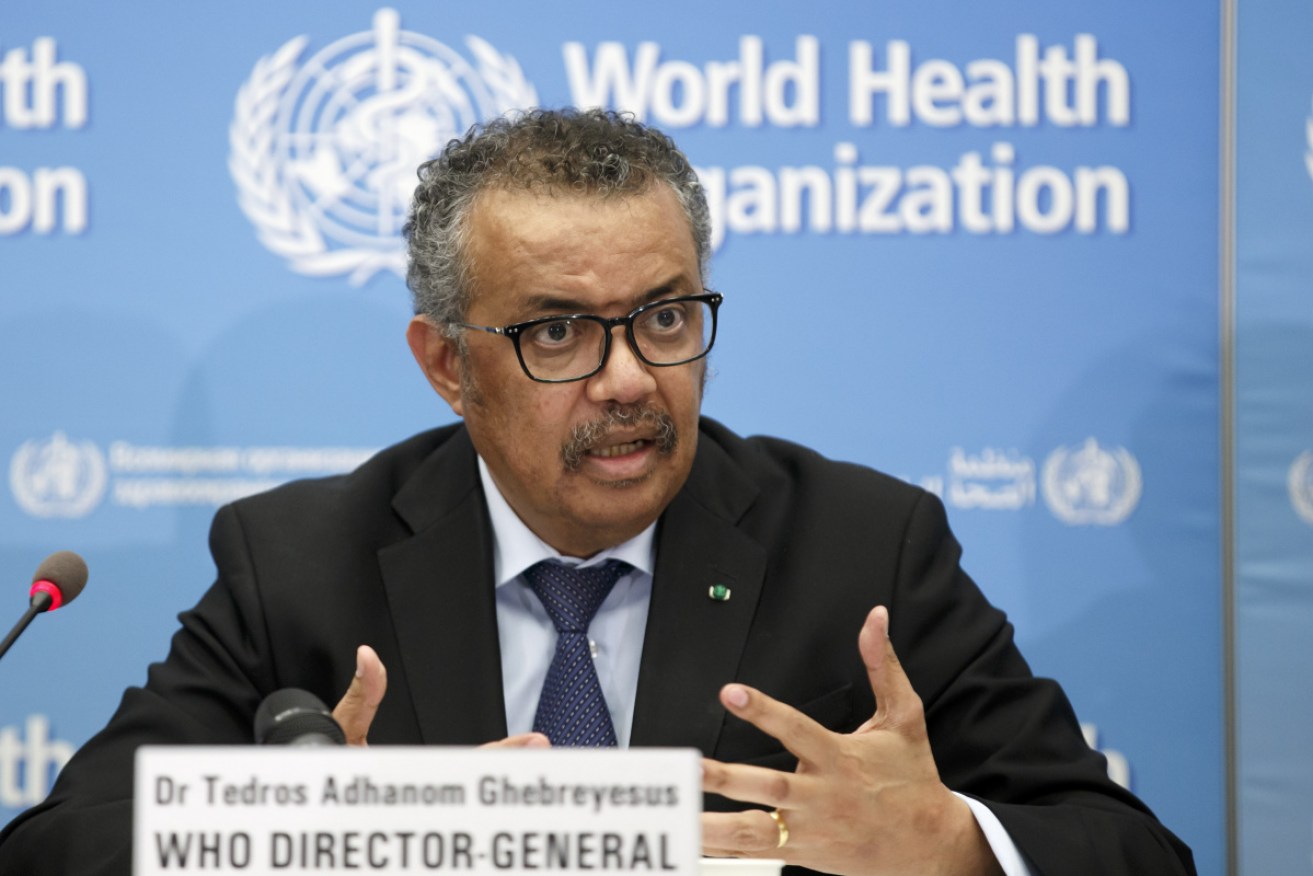WHO chief warns world leaders not to ‘politicise’ pandemic

WHO chief Tedros Adhanom Ghebreyesus hopes the COVID pandemic could be over in two years. Photo: AAP
World leaders must not politicise the coronavirus pandemic but unite to fight it, the head of the World Health Organisation warns, reminding all that the pandemic is still accelerating and producing record daily increases in infections.
The comments by Tedros Adhanom Ghebreyesus, who has faced criticism from US President Donald Trump, came as the number of reported infections soared in Brazil, Iraq, India and southern and western US states, straining local hospitals.
In New York City, once the epicentre of the US outbreak, Monday was a key day for lifting many coronavirus lockdown restrictions.
It took more than three months for the world to see one million virus infections but the last one million cases have come in just eight days, Dr Tedros said during a videoconference for the Dubai-based World Government Summit.
Good #HandHygiene plays a critical part in fighting #COVID19!
The virus primarily spreads through droplet & contact transmission: by touching infected people, contaminated objects or surfaces. Your hands can spread virus to other surfaces & to your 👄, 👃 or 👀 if you touch them. pic.twitter.com/FguCCqfM70— World Health Organization (WHO) (@WHO) June 22, 2020
Dr Tedros never mentioned Mr Trump’s name or the fact he was determined to pull the United States out of the UN health agency but warned against “politicising” the pandemic.
“The greatest threat we face now is not the virus itself, it’s the lack of global solidarity and global leadership,” he said.
“We cannot defeat this pandemic with a divided world.”
Mr Trump has criticised the WHO for its early response to the outbreak and what he considers its excessive praise of China, where the outbreak began, as his administration’s response in the US has come under scrutiny.
In response, Mr Trump has threatened to end all US funding for the WHO.
Nearly nine million people have been infected by the virus worldwide and more than 468,000 have died, according to figures compiled by Johns Hopkins University.
“The COVID-19 pandemic has demonstrated that, indeed, the world was not prepared,” Dr Tedros said.
“Globally, the pandemic is still accelerating.”
Virus tally: Check the latest infections and deaths
Companies around the world are racing to find a vaccine to counter COVID-19 and there is a fierce debate about how to make sure that vaccine is distributed fairly.
Speaking later in the conference, WHO’s special envoy on COVID-19 Dr David Nabarro said he believed it would be “2½ years until there will be vaccine for everybody in the world”.
India’s health system has been slammed by the virus.
The country’s caseload climbed by nearly 15,000 on Monday to 425,282, with more than 13,000 deaths.
After easing a nationwide lockdown, the Indian government ran special trains to return thousands of migrant workers to their villages in recent weeks.
Nearly 90 per cent of India’s poorest districts have cases, although the outbreak remains centred in Delhi, Maharashtra and Tamil Nadu states, which are home to major cities.
In Pakistan, infections are accelerating and hospitals are having to turn away patients, with new cases up to 6800 a day in mid-June.
The government has relaxed pandemic restrictions, hoping to salvage a near-collapsed economy as the number of people living in poverty has risen to 40 per cent, up from 30 per cent of the population of 220 million people.
In Iraq, masked workers were setting up makeshift coronavirus wards in Baghdad’s vast exhibition grounds as a long-dreaded spike in infections strained its overstretched hospitals, battered by years of conflict and poor infrastructure.
More than two-thirds of the new deaths of late have been reported in the Americas.
The coronavirus has killed about 120,000 people across the US, more than 50,000 in Brazil and nearly 22,000 in Mexico.
US authorities have reported more than 30,000 new infections a day in the past few days.
Infections have slowed in China and South Korea, suggesting some progress in stemming their newest outbreaks.
South Korea reported 17 new cases, the first time its daily increase fell to under 20 in nearly a month and Beijing’s increase was in single digits for the first time in eight days.
However, South Korean authorities said the country was in the midst of a “second wave” of novel coronavirus infections around Seoul.
-AAP








